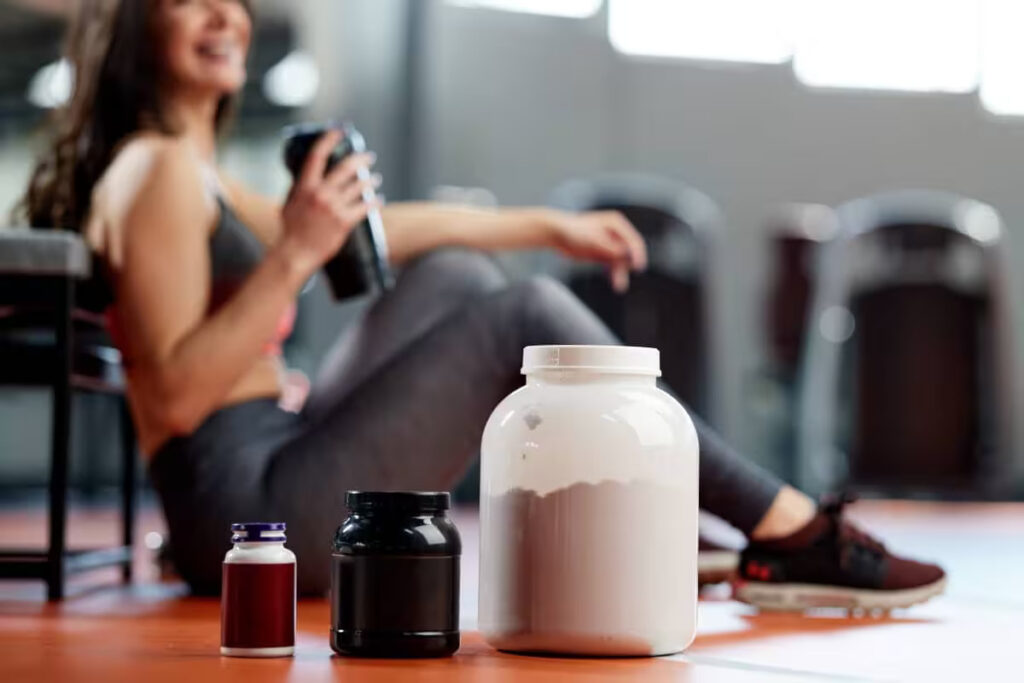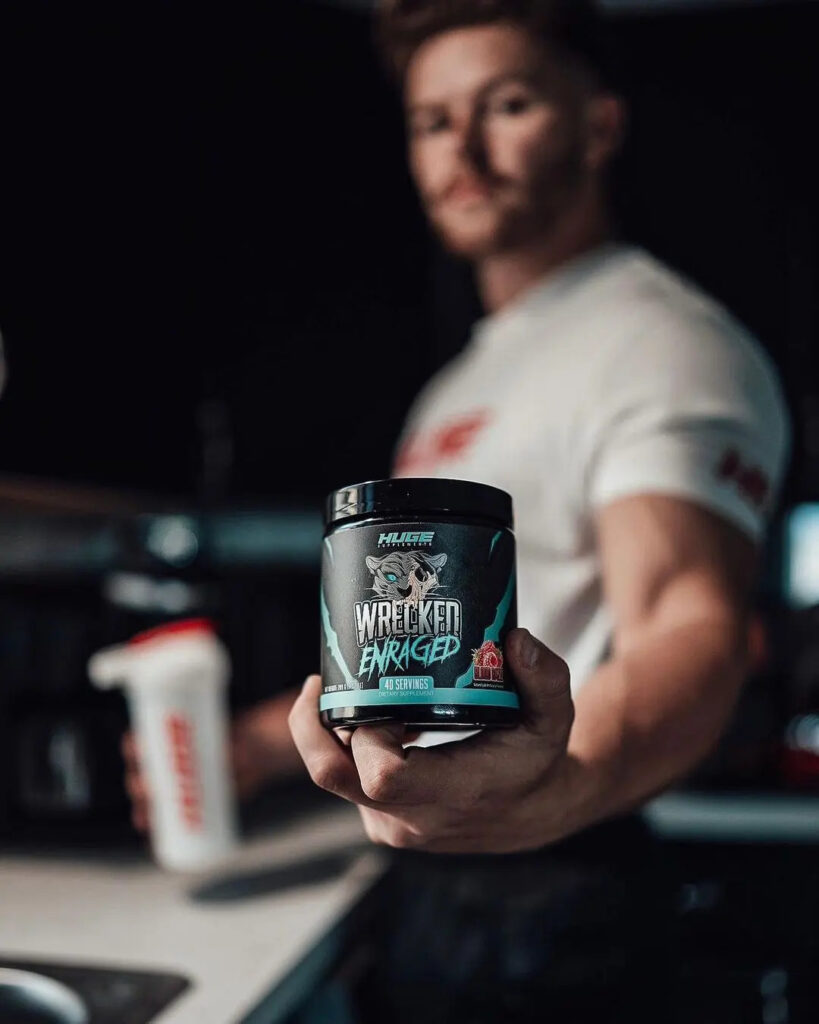What Is DMAA Pre-Workout?
What is DMAA pre-workout? DMAA once used to be a common ingredient in many pre-workout supplements as a stimulant that enhances cognition.
Can pre workouts kill you? Yes, however, it is important to note that deaths associated with pre-workout supplements use are relatively rare and the precise cause of death in these cases is often difficult to determine, as other factors may be involved.
It has been associated with improving memory and reaction time although there have been more associations with adverse effects such as increasing blood pressure and the risks of heart issues and bleeding in the brain. As a result it is now a widely banned pre-workout ingredient.
Alternatively, there are other more well-researched performance-enhancing ergogenics with a better safety profile.
Disclaimer
It is not recommended to take DMAA or any other supplement containing this ingredient.

What is DMAA?
DMAA (1,3-dimethylamylamine) is a stimulant that has been used in some pre-workout supplements.
DMAA is a sympathomimetic drug, meaning that it works by stimulating the sympathetic nervous system, which controls the “fight or flight” response in the body. DMAA is believed to work by increasing the levels of certain neurotransmitters in the brain, such as dopamine, norepinephrine, and epinephrine. These neurotransmitters can increase alertness, energy levels, and focus.
DMAA can also cause vasoconstriction, or the narrowing of blood vessels, which can increase blood pressure and improve blood flow to muscles during exercise.
It has been popular among athletes with the intention of being used to improve performance due to the function this compound has on dopamine, a particular neurotransmitter that affects the body’s movement, muscles, concentration, and attention span.
However, DMAA has been found to have similar effects as ephedrine and amphetamine, and is associated with numerous adverse effects, including increased blood pressure and heart rate, panic attacks, seizures, stress-induced cardiomyopathy, stroke, and death.
In fact, in 2012 the U.S. FDA (Food and Drug Administration) started issuing warning letters to companies producing DMAA-containing products that these products violate the law and companies were required to remove these products from the market. It is now considered an illegal pre-workout ingredient in many jurisdictions.
There are many other safe and effective ingredients and pre-workout supplements available that can provide similar benefits without the potential risks and dangers associated with DMAA.

What Are DMAA Side Effects on the Body?
Positive Effects
Improved Reaction Time and Cognitive Efficiency
A study evaluated the neurocognitive performance following consumption of a DMAA-containing supplement and found participants had improved memory, visual processing speed, and reaction time. However, the improvements were small and therefore, of questionable importance.
Additionally, the study had a small sample size and the supplement also contained other ingredients making it uncertain whether the results may be associated with any of the other ingredients in the supplement.
Potentially Aids Weight/Fat Loss
A supplement containing DMAA and multiple other ingredients has been associated with an increase in fat breakdown and metabolic rate. In theory DMAA acts as a norepinephrine reuptake inhibitor and/or norepinephrine releasing agent and therefore, its effect on lipolysis is similar to that of the stress response. However, this effect may be due to the other ingredients or combination thereof in the supplement.
Potentially Decreases Appetite
The same supplement studied above has been shown in another study to significantly reduce appetite when taken for 14 consecutive days. Again, it is uncertain which of the specific ingredients in the supplement contributes to this effect.

Negative Effects
Increases Blood Pressure
DMAA can constrict the blood vessels in a dose-dependent manner, which leads to an elevation in blood pressure. This can be a cause for concern for any individuals with a history of high blood pressure, are using other supplements or drugs that may increase blood pressure, and/or engage in strenuous physical activity.
Risks of Myocardial Infarction and Cardiac Arrest
There have been case reports on individuals who did not display the typical risk factors for heart disease but consumed a DMAA-containing supplement prior to exercise, and suffered an acute MI and cardiac arrest.
Risk of Cerebral Hemorrhaging
In a review of separate cases of individuals who ingested DMAA in recreational settings, hospital assessment of all these individuals demonstrated cerebral hemorrhaging. However, the amount of DMAA consumed in these cases were many times more than the usual amount in a serving of a dietary supplement and it is possible that other substances may have been consumed owing to the setting DMAA was taken.

What Are DMAA Alternatives?
Caffeine
Caffeine has had widespread use as an ergogenic aid in sport and exercise performance. It has been shown to improve endurance, strength, cognitive function, and anaerobic and aerobic performance. A dose of 3–6mg/kg body mass has been consistently shown to improve exercise performance.
There’s more. Caffeine may promote weight loss by increasing energy expenditure, metabolic rate and fat oxidation during exercises. Studies have shown that caffeine can reduce feelings of hunger and increase feelings of fullness, leading to a decrease in overall calorie intake. Caffeine may also reduce the desire for sweet and high fat foods, which can contribute to weight gain.
Its safety is well-studied and most athletes are able to find effective dosages without side effects.
P-Synephrine
P-synephrine has been shown to increase fat oxidation or breakdown during exercise of low to moderate intensity (i.e., between 30–80% of VO2max). A dose of at least 2mg/kg of body mass appears to be needed with the effect on fat oxidation plateauing at a dose of 3mg/kg of body mass. Available information suggests that p-synephrine is a safe substance for acute and chronic ingestion in doses up to 1–3 mg/kg of body mass.
Theacrine
Theacrine is a compound similar to caffeine and has been marketed to provide the similar benefits to caffeine without the side effects such as fast heart rate, agitation, and habituation. However, it has been shown that an 8-week supplementation of theacrine does not improve physical performance. Although in another study, theacrine was shown to significantly improve energy, focus, and fatigue.
Huge Supplements’ Wrecked Enraged Pre-Workout
You don’t need to take any risks with banned substances as DMAA to enhance your workout. Modern pre-workouts offer an effective compound of approved substances to help improve various aspects of athletic performance with a low risk of negative side effects.
Take a look at Huge Supplements’ Wrecked Enraged pre-workout supplement contains multiple ingredients that may enhance cognitive and/or physical performance.
Beta alanine supplementation daily at a dose of 4–6g for at least 4 weeks has been shown to improve exercise performance especially time trials that are 1–4 minutes long. This pre-workout has 2g of beta alanine per scoop.

Alpha GPC has been shown to increase physical and psychomotor performance. Studies have used a dosage of 300–600mg, 30–60 minutes before exercise. This product contains 500mg per scoop.
Caffeine has been shown to have performance benefits in a variety of exercises. Doses of 3–6mg/kg body weight have been shown to be effective. This product contains a total of 200mg of caffeine, per scoop, from three sources: caffeine anhydrous, di-caffeine malate, and caffeine citrate.
Other notable sources in this product include black pepper extract or piper nigrum, which has been shown to support cognitive functioning and enhance nutrient absorption. This product also contains various nootropics and stimulants meant to enhance mental performance, such as phenethylamines, huperzine A, and N-Isopropylnorsynephrine. If you have any concerns about using such ingredients, consult with a healthcare professional before using the supplement.

FAQ
Is DMAA A Drug?
DMAA is a synthetic stimulant commonly found in dietary supplements marketed for weight loss, bodybuilding, and athletic performance. It is associated with an increase in heart rate, blood pressure, and energy levels. It was originally developed as a nasal decongestant. However, its safety and efficacy as a dietary supplement ingredient have been questioned, and it has been banned in several countries. Therefore, DMAA can be considered a drug.
Is DMAA Illegal?
DMAA has been illegal since 2013 although there are dietary supplements and pre-workouts with DMAA that continue to be produced and marketed.
Are There Steroids In DMAA?
DMAA is not a steroid and does not contain steroids. It is a synthetic stimulant that is chemically similar to amphetamines and ephedrine.
Conclusion
Here we discussed what DMAA is, DMAA pre-workout effects on the body and why we do not recommend taking DMAA or any other supplement containing this ingredient. We also offer effective alternatives with a good safety profile. It is important to discuss your questions and concerns with a healthcare professional when starting new supplements or products to make sure they are right for you.
Have you heard of DMAA before? What has your experience been with pre-workout supplements? Feel free to share any thoughts you have, below!
Also read:
- G Fuel vs Pre Workout
- Pre Workout vs Post Workout
- Caffeine Pills vs Pre Workout
- Pre Workout vs Fat Burner
- Best Pre Workout With Low Caffeine
- Pre Workout vs Coffee
- Bcaa vs Pre Workout
- Best Nitric Oxide Pre Workout
References:
- DMAA as a Dietary Supplement Ingredient // Jamanetwork: https://jamanetwork.com/ journals/jamainternalmedicine /fullarticle/1157413
- DMAA in Products Marketed as Dietary Supplements // FDA: https://www.fda.gov/food/ dietary-supplement-ingredient-directory/ dmaa-products-marketed-dietary-supplements
- Acute Stimulant Ingestion and Neurocognitive Performance in Healthy Participants // NIH: https://www.ncbi.nlm.nih.gov/ pmc/articles/PMC4560020/
- A Finished Dietary Supplement Stimulates Lipolysis and Metabolic Rate in Young Men and Women // NIH: https://www.ncbi.nlm.nih.gov/ pmc/articles/PMC3698474/
- Biochemical and Anthropometric Effects of a Weight Loss Dietary Supplement in Healthy Men and Women // NIH: https://www.ncbi.nlm.nih.gov/ pmc/articles/PMC3698475/
- 1,3-Dimethylamylamine (DMAA): A Brief History and Review of Anecdotal and Laboratory Findings // Heraldopenaccess: https://www.heraldopenaccess.us/ openaccess/ 1-3-dimethylamylamine-dmaa-a-brief-history-and-review-of-anecdotal-and-laboratory-findings
- Acute Myocardial Infarction Associated with Dietary Supplements Containing 1,3-Dimethylamylamine and Citrus aurantium // NIH: https://www.ncbi.nlm.nih.gov/pmc /articles/PMC3967491/
- Cardiac Arrest in a 21-Year-Old Man After Ingestion of 1,3-DMAA–Containing Workout Supplement // Clinical journal of sport medicine: https://journals.lww.com/ cjsportsmed/Abstract/2015/ 01000/Cardiac_Arrest_in_a _21_Year_Old_Man_After.16.aspx
- Use of recreational drug 1,3 Dimethylamylamine (DMAA) [corrected] associated with cerebral hemorrhage // NIH: https://pubmed.ncbi.nlm.nih.gov /22575212/
- International society of sports nutrition position stand: caffeine and exercise performance // Biomedcentral: https://jissn.biomedcentral.com/ articles/10.1186/s12970-020-00383-4
- Normal caffeine consumption: influence on thermogenesis and daily energy expenditure in lean and postobese human volunteers // NIH: https://pubmed.ncbi.nlm.nih.gov/ 2912010/
- The Safety of Ingested Caffeine: A Comprehensive Review // NIH: https://www.ncbi.nlm.nih.gov/pmc /articles/PMC5445139/
- Effects of p-Synephrine during Exercise: A Brief Narrative Review // NIH: https://www.ncbi.nlm.nih.gov/ pmc/articles/PMC7830131/
- Safety of TeaCrine®, a non-habituating, naturally-occurring purine alkaloid over eight weeks of continuous use // NIH: https://www.ncbi.nlm.nih.gov/ pmc/articles/PMC4711067/
- Theacrine does not enhance physical performance or training status over 8 weeks // Wageningenacademic: https://www. wageningenacademic.com /doi/10.3920/CEP210034
- A Two-Part Approach to Examine the Effects of Theacrine (TeaCrine®) Supplementation on Oxygen Consumption, Hemodynamic Responses, and Subjective Measures of Cognitive and Psychometric Parameters // NIH: https://pubmed.ncbi.nlm.nih.gov /27164220/
- International society of sports nutrition position stand: Beta-Alanine // NIH: https://www.ncbi.nlm.nih.gov /pmc/articles/PMC4501114/
- Evaluation of the effects of two doses of alpha glycerylphosphorylcholine on physical and psychomotor performance // NIH: https://www.ncbi.nlm.nih.gov/ pmc/articles/PMC5629791/
- International society of sports nutrition position stand: caffeine and exercise performance // BMC: https://jissn.biomedcentral.com/ articles/10.1186/s12970-020-00383-4
- Black pepper and health claims: a comprehensive treatise // NIH: https://pubmed.ncbi.nlm.nih.gov /23768180/
- Be in the Know Dietary Supplements for Cognitive Performance // Jsomonline: https://www.jsomonline.org/ SharedScience/ 20202132Crawford.pdf
Why Trust Us?
With over 20 years in Olympic Weightlifting, our team does its best to provide the audience with ultimate support and meet the needs and requirements of advanced athletes and professional lifters, as well as people who strive to open new opportunities and develop their physical capabilities with us.
By trusting the recommendations of our certified experts in coaching, nutrition, dietology, and sports training programming, as well as scientific consultants, and physiotherapists, we provide you with thorough, well-considered, and scientifically proven content. All the information given in the articles concerning workout programming, separate exercises, and athletic performance, in general, is based on verified data. We ensure that you can rely on our professionals’ pieces of advice and recommendations that can be treated as personalized ones which will benefit you and fully meet your needs.
The product testing process is described in more detail here
Author: Oleksandr Maksymenko
Certified Sports Nutritionist,
MSc Sports Dietetics
Specializing in: Weight management, Fitness / Sports nutrition
Oleksandr is a professional fitness nutritionist certified by the Fitness Professional Association (FPA). He follows the principles of evidence-based dietetics and fosters a healthy relationship with food in his clients, ensuring there are no strict prohibitions on their favorite foods or frequent lapses. His primary goal is not only to achieve results for you but also to sustain them over the long term, all while enjoying tasty and delicious food.








